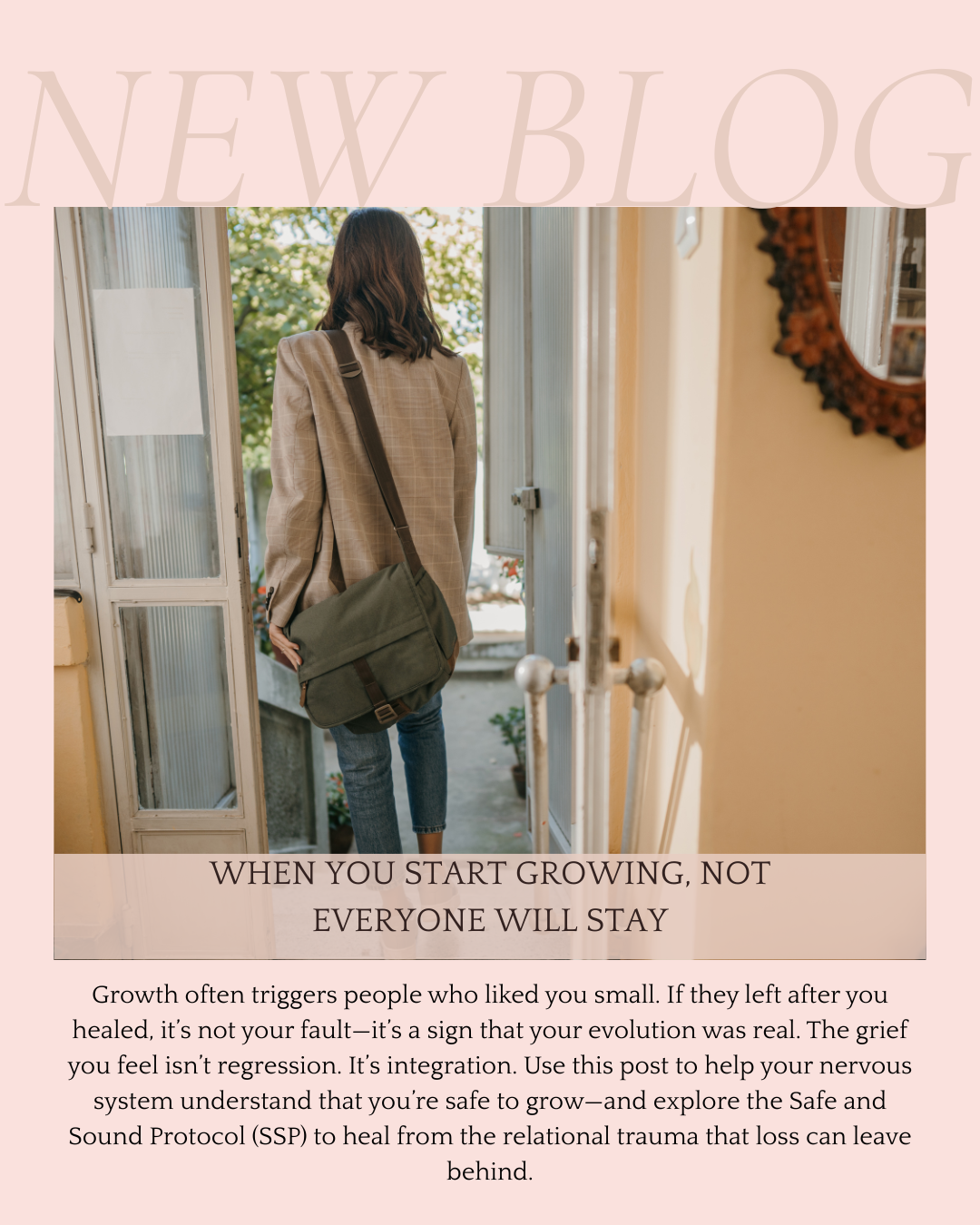What if the people who walked away didn’t abandon you—but revealed their limits?
There’s a grief we don’t talk about enough.
Not the kind that comes from death.
Not even the kind that comes from betrayal.
But the grief of outgrowing someone—and leaving them or watching them walk away as a result.
Maybe you were healing.
Maybe you started speaking up.
Maybe you set boundaries, found your voice, or redefined your self-worth.
And suddenly, the people who once claimed to love you… couldn’t seem to look you in the eye anymore.
They didn’t leave because you became someone worse. They left because you became someone they couldn’t control, predict, or shrink anymore.
Let’s talk about what happens when growth threatens your relationships, why their absence isn’t proof you’re unlovable, and how your nervous system can heal from the loneliness of doing the right thing for yourself.
Growth Can Feel Like Loss—But It’s Actually Liberation
When You Start Healing, Not Everyone Claps
Personal growth is beautiful, but it can also be deeply lonely.
Because when you change the rules of who you are—when you stop saying “yes” to everything, when you stop laughing at jokes that hurt, when you stop making yourself small—it threatens people who benefited from the old version of you.
Especially those who:
- Liked you more when you had no boundaries
- Preferred you compliant
- Needed you broken to feel strong themselves
They didn’t leave because you became someone unworthy.
They left because they didn’t know how to stay with someone who finally valued themselves.
Misconceptions About Losing People When You Heal
Lie #1: “You Changed. That’s Why They Left.”
The truth?
You did change. But not in the way they mean.



That’s not a character flaw. That’s growth.
And people who require your disempowerment to stay connected will always call your healing a betrayal.
Lie #2: “If They Left, You Must Have Done Something Wrong.”
No.
Sometimes people walk away not because you did something wrong—but because you stopped doing what made them comfortable.
You stopped being quiet.
You stopped ignoring red flags.
You stopped abandoning yourself to keep the relationship alive.
And that scared them.
Lie #3: “Good People Don’t Walk Away from You.”
Sometimes, even good people outgrow you. Or can’t grow with you. Or never planned to.
It doesn’t mean they’re bad—it means they’re not your people anymore.
Mourning their absence doesn’t mean you want them back. It means you’re honoring what was lost—and moving toward what’s next.
Your Nervous System on Relationship Loss
Let’s talk biology for a moment.
When we lose connection—especially with someone who once felt safe—our nervous system responds as if we’re in danger.
Because for much of human evolution, rejection meant death.
That’s why:




Your body is responding to relational loss as if it’s a threat.
Even if leaving was healthy. Even if it was mutual. Even if it was necessary.
This is why healing from abandonment isn’t just emotional—it’s somatic.
Your nervous system needs help catching up with the truth:
“I am not in danger. I am safe. I am allowed to grow.”
How to Heal from the Loss That Comes with Growth
1. Acknowledge That It’s Still a Loss
You can grieve the people who left without regretting your growth.
Let both be true:


Give yourself permission to feel the loss without romanticizing the pain.
2. Remind Yourself What You Were Protecting
Reflect on:



These questions reconnect you with the power behind your healing.
3. Rebuild Safety in New Relationships (Starting with Yourself)
It’s not about replacing the people who left.
It’s about creating space for people who can meet you here—in your truth, in your wholeness, in your now.
Start with:



And if your body is still reacting to old abandonment patterns?
There’s help for that, too.
Try SSP to Help Your Nervous System Release Relationship Fear
The Safe and Sound Protocol (SSP) is a listening-based therapy designed to help your nervous system rewire its relationship with safety, trust, and connection.
SSP helps by:




Because real growth doesn’t just happen in your mind—it happens in your body.
Click “SSP” if you want to explore how this tool can help you feel safe enough to grow—and to let go.
You Didn’t Lose Them. They Lost the Privilege of You
The people who left weren’t your loss.
They were your mirror—showing you the exact point where you outgrew the version of yourself that kept you small.
You didn’t push them away.
You just stopped shrinking to make them comfortable.
And while that may feel lonely at first, it’s also a kind of liberation.
Because now?
You’re not waiting for someone to accept your growth.
You’re learning to accept yourself—and call in people who do the same.
Ready to Let Go and Grow Without Fear?
You don’t have to carry the emotional residue of abandonment in your nervous system forever.
Reach out to work with a therapist who specializes in nervous system regulation, attachment wounds, and trauma-informed growth.
You deserve to grow without fear of losing love for it.
TL;DR
Growth often triggers people who liked you small. If they left after you healed, it’s not your fault—it’s a sign that your evolution was real. The grief you feel isn’t regression. It’s integration. Use this post to help your nervous system understand that you’re safe to grow—and explore the Safe and Sound Protocol (SSP) to heal from the relational trauma that loss can leave behind.
Subscribe below:
Let us reach out to you:
personal growth, trauma healing, abandonment, boundaries, nervous system support, Safe and Sound Protocol, emotional grief, attachment wounds, outgrowing relationships, healing loneliness

